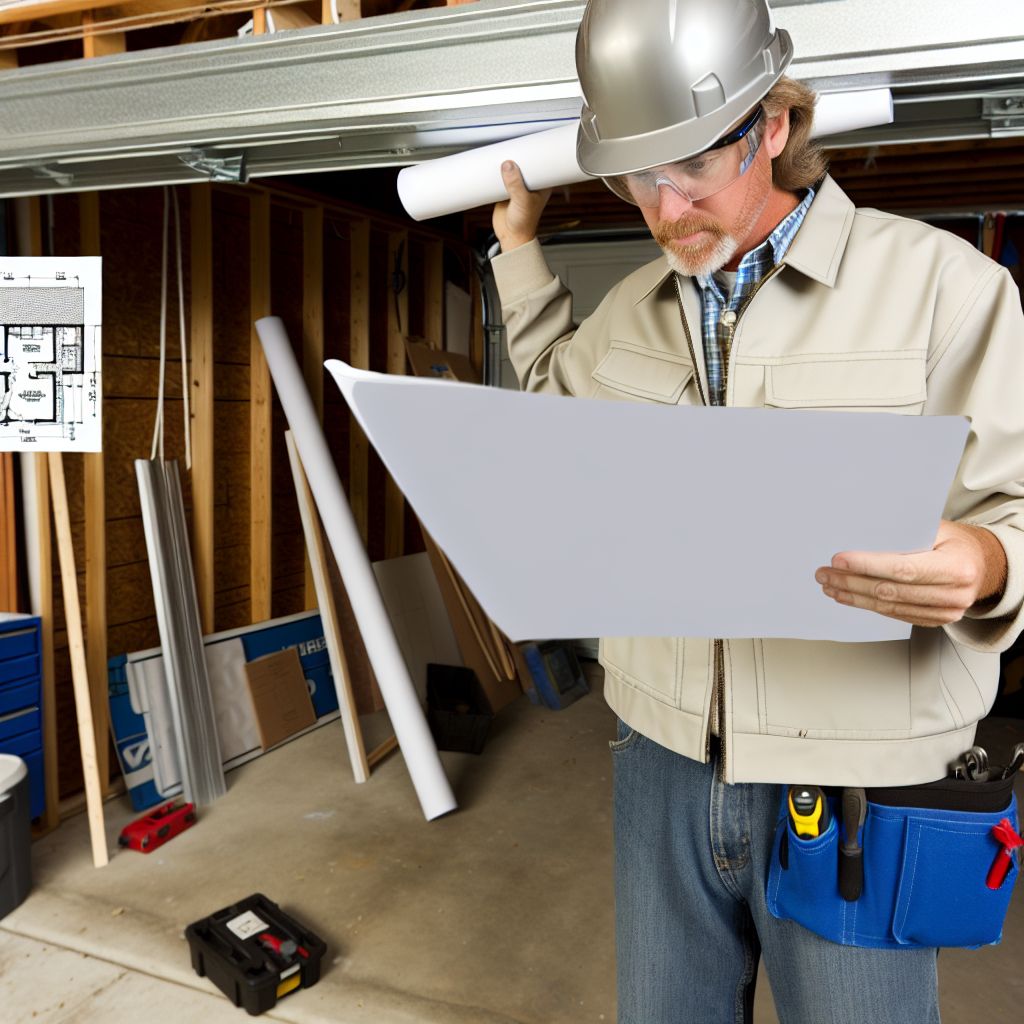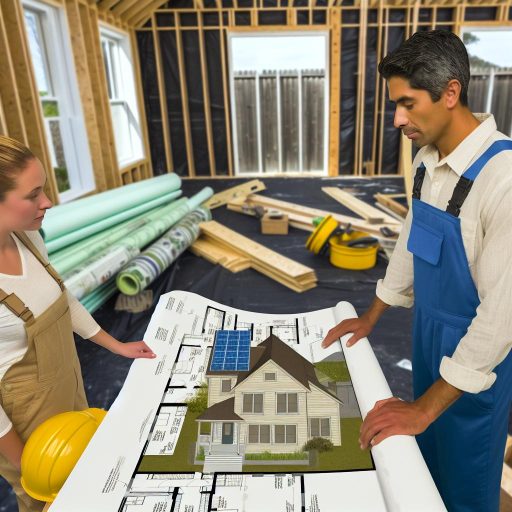Understanding Garage Conversions
Purpose of Garage Conversions
Garage conversions serve multiple purposes for homeowners.
They provide additional living space, which is often needed in growing families.
Moreover, converting a garage can significantly increase property value.
Homeowners often use the converted space as an office, gym, or guest room.
By doing this, they maximize the utility of existing structures.
Benefits of Garage Conversions
One immediate benefit is the expansion of usable living space.
This expansion allows homeowners to avoid the costs of moving to a larger property.
Additionally, garage conversions can adapt to evolving lifestyle needs.
For instance, they can become playrooms for children or studios for artists.
Furthermore, they can enhance energy efficiency if properly insulated.
Financial Considerations
Garage conversions typically offer a solid return on investment.
However, costs can vary depending on the specifics of the project.
For example, more extensive renovations will naturally require a larger budget.
It’s crucial for homeowners to estimate these costs in advance.
Additionally, they should consider any potential permits or regulations.
Long-Term Impact
Transforming a garage often improves the overall aesthetic of a home.
Many people appreciate the added functional space and fresh appearance.
Consequently, this can lead to longer-term satisfaction with the property.
Furthermore, it can positively influence neighborhood appeal.
Ultimately, a successful garage conversion can improve daily living and enhance community value.
Factors Influencing Renovation Costs for Garage Conversions
Size of the Garage
The size of the garage plays a significant role in the overall cost.
Larger garages require more materials and labor.
Consequently, costs increase with size.
Type of Conversion
The type of conversion affects the budget significantly.
For instance, a simple storage area costs less than a full living space.
Moreover, using the garage as an office or gym represents different pricing structures.
Materials Used
The choice of materials can impact renovation expenses greatly.
High-quality materials tend to raise the overall budget.
In contrast, using cost-effective options can help save money.
Labor Costs
Labor rates vary widely based on location and expertise.
Moreover, specialized contractors may charge a premium for their services.
Ultimately, skilled labor can lead to higher quality work and longer durability.
Permits and Regulations
Obtaining necessary permits can add to renovation costs.
Municipal regulations often dictate specific requirements for conversions.
Neglecting permits may lead to fines and costly rework later.
Existing Structure Condition
The current state of the garage influences the total expenses.
If significant repairs are needed, expect higher costs.
Addressing issues like mold or structural damage is crucial for safety.
Design and Layout
The complexity of the design can also affect renovation costs.
Custom layouts require additional labor and materials.
Conversely, simpler designs can reduce spending.
Utility Connections
Adding electrical or plumbing connections adds to the renovation budget.
Upgrading existing systems also incurs additional costs.
However, these upgrades are essential for full functionality.
Location and Market Conditions
Your geographic location can influence both labor and material prices.
Urban areas typically have higher costs compared to rural regions.
Market demand for renovation services within your area also matters.
Renovation Cost Estimation for Garage Conversions
Materials
When converting a garage, materials significantly impact overall costs.
The types of materials you choose will affect durability and aesthetics.
Common materials include insulation, drywall, flooring, and paint.
High-quality insulation can reduce energy costs in the long run.
Flooring options range from concrete to hardwood, each with unique pricing.
Additionally, hardware and fixtures also contribute to material expenses.
Researching material options helps you stay within budget.
Labor
Labor costs are a major part of the renovation budget.
Hiring skilled professionals can ensure quality work.
Labor rates vary depending on location and expertise.
Consider subcontracting specific tasks to specialists if needed.
Including labor in your estimates allows for better budgeting.
Always get multiple quotes before deciding on a contractor.
Engaging a general contractor can simplify the hiring process.
Permits
Obtaining the necessary permits is crucial for any renovation project.
Permitting costs vary by locality and project scope.
Check with your local building department for specific requirements.
Some areas may require architectural plans for approval.
Include time and costs for permit applications in your budget.
Proper permits protect you from future legal issues or fines.
Finally, factor in potential inspection fees during the process.
Find Out More: Renovation Cost Estimation for Multi-Family Properties
Estimating Labor Costs: DIY vs. Hiring Professionals
Understanding DIY Labor Costs
Undertaking a garage conversion yourself significantly reduces costs.
However, consider your skill level before proceeding.
It’s essential to assess your experience with various tasks.
Common tasks may include framing, electrical work, and plumbing.
Gather the necessary tools and materials before starting your project.
Budget for materials as they can add up quickly.
Moreover, ensure you factor in time spent on the project.
Realistically, DIY projects can exceed initial time estimates.
Account for potential mistakes that may require fixes.
Evaluating the Benefits of Hiring Professionals
Hiring professionals brings expertise and efficiency to your project.
Experienced contractors can typically finish projects faster.
They understand building codes and local regulations.
Additionally, professionals may provide warranty options for their work.
This can offer peace of mind and protect your investment.
Labor costs often vary based on the contractor and region.
Discuss budgets upfront to avoid surprises during the project.
Collect multiple quotes from various contractors for comparison.
Comparing Total Costs
When comparing DIY and professional costs, look beyond labor.
Consider whether hiring a contractor saves you time.
Calculate your hourly wage if you were to work instead.
Your time may be better spent on income-generating activities.
In addition, assess the quality of work you expect.
If high standards are essential, hiring professionals may be worth it.
Overall, balance your budget against your skills and available time.
Find Out More: Renovation Cost Estimation for Aging-in-Place Upgrades
Importance of Budgeting in Garage Conversions
Setting a Realistic Cost Estimate
Creating a budget for garage conversions is a crucial step.
A realistic cost estimate ensures you stay financially on track.
It helps to prevent unexpected expenses from derailing your project.
Start by analyzing the specific renovation features you want.
Consider aspects like insulation, plumbing, and electrical work.
These elements can significantly impact overall costs.
Next, gather quotes from contractors in your area.
Different contractors may offer varying price points for similar work.
Additionally, research the average costs associated with garage conversions.
This will provide a benchmark for your budgeting process.
Remember to factor in permits and inspections as part of the expenses.
These are necessary for ensuring compliance with local regulations.
Furthermore, include a contingency fund for unexpected issues.
Typical recommendations suggest setting aside 10-20% of your budget.
Finally, monitor expenses throughout the project regularly.
This ensures you remain within your budget limits.
In summary, setting a realistic cost estimate is vital for success.
It ultimately leads to a smoother renovation experience.
Delve into the Subject: Luxury Home Upgrades That Provide the Ultimate Smart Home Experience

Hidden Costs: What to Watch Out for During Renovation
Understanding Hidden Costs
Home renovations can quickly escalate in price.
Many homeowners overlook hidden costs during planning.
Understanding these financial pitfalls is crucial.
Permits and Fees
Obtaining necessary permits often incurs additional fees.
These costs can vary widely based on location.
Always check with local authorities before starting.
Structural Changes
Modifying the garage structure can lead to unexpected expenses.
Hidden problems may arise when altering walls or ceilings.
For instance, electrical wiring may need updates.
Insufficient framing might require reinforcements.
Utilities and Upgrades
Adding plumbing or electrical systems increases costs significantly.
Outdated systems may not meet current codes.
Costs for necessary upgrades can quickly add up.
Interior Finishes
Choosing high-end materials can drain your budget.
Always consider the potential hidden costs of finishes.
Installing flooring, cabinets, and fixtures can be costly.
Unexpected Repairs
As renovations progress, unexpected issues often arise.
Mold, pests, or structural damage may need immediate attention.
Setting aside a contingency fund is essential for such surprises.
Labor Costs
Underestimating labor costs can lead to budget overruns.
Rates vary among contractors and depend on complexity.
Always obtain multiple quotes before deciding.
Timeline Delays
Delays can lead to increased costs for materials and labor.
Plan for potential setbacks in your renovation timeline.
Incorporating a buffer can help manage these risks.
Cost Management Strategies
Educating yourself about hidden costs helps manage your budget.
Stay proactive throughout the renovation process.
Maintain open communication with your contractors.
Delve into the Subject: Luxury Home Upgrades That Improve Comfort and Energy Efficiency
Maximizing ROI: Cost-effective Strategies for Garage Conversions
Understanding Your Goals
Start by defining your objectives for the garage conversion.
Consider whether you want extra living space or a rental unit.
Your goals will influence the overall design and budget.
Assessing the Current Space
Evaluate the existing garage structure thoroughly.
Inspect for any necessary repairs or upgrades.
Check if the foundation and roof are in good condition.
Setting a Realistic Budget
Create a detailed budget for your garage conversion project.
Include costs for design, materials, and labor.
Consider setting aside a contingency fund for unexpected expenses.
Optimizing the Design
Focus on an open floor plan to maximize space.
Incorporate natural light through windows or skylights.
Choose multi-functional furniture to save space and enhance usability.
Selecting Cost-effective Materials
Choose economical and durable materials for your project.
Consider reclaimed wood or recycled materials for sustainability.
Research local suppliers for better pricing on essential materials.
Hiring the Right Contractors
Choose skilled contractors with experience in garage conversions.
Request quotes from multiple professionals to compare costs.
Check references and past projects before making a decision.
Planning for Necessary Permits
Check local zoning laws before starting the conversion process.
Research what permits are necessary for your project.
Planning ahead can prevent delays and additional costs.
Incorporating Energy Efficiency
Invest in insulation to enhance energy efficiency.
Consider installing energy-efficient windows and doors.
Utilize LED lighting to reduce long-term electricity costs.
Marketing the Space for Rental
If you plan to rent the space, research the local rental market.
Consider staging the area to attract potential tenants.
Highlight unique features and amenities in your listings.
Comparing Costs by Region
Urban Garage Conversions
Urban areas tend to have higher renovation costs for garage conversions.
This increase is often due to real estate prices and labor rates.
Additionally, urban sites frequently require permits and inspections.
For instance, in cities like New York, costs can escalate quickly.
Moreover, materials may be more expensive due to demand.
Urban planners also often face zoning restrictions that add complexity.
Overall, homeowners might need to budget more in urban settings.
Rural Garage Conversions
In contrast, rural garage conversions generally cost less.
This reduction arises from lower labor and material costs.
Additionally, rural areas may have fewer zoning restrictions.
Homeowners usually find permits easier to obtain outside cities.
For example, in regions like Nebraska, costs are significantly lower.
This affordability encourages more renovation projects in rural settings.
Ultimately, this creates opportunities for expanding living space.
Factors Influencing Costs
Several factors can influence the cost of garage conversions.
Local economies play a crucial role in determining prices.
Furthermore, the type of conversion—simple storage or full living space—affects costs.
Homeowner design choices can also impact overall pricing.
For instance, luxury materials can substantially raise expenses.
Finally, the condition of the existing garage is essential to consider.
Cost Estimation Tips
Accurate cost estimations are vital for renovation success.
Start by researching local contractors for realistic quotes.
Additionally, consider obtaining multiple estimates for comparison.
Factor in potential hidden costs, such as structural changes.
Lastly, always leave room in your budget for unforeseen expenses.




